Launch Your Counseling Career
The Master of Arts in Clinical Mental Health Counseling (CMHC) program at Palo Alto University is dedicated to training highly effective counselors and future leaders who promote mental health, wellness, social justice, and vocational well-being. Our accredited program focuses on reducing human suffering by preparing students to make a positive impact in their communities.
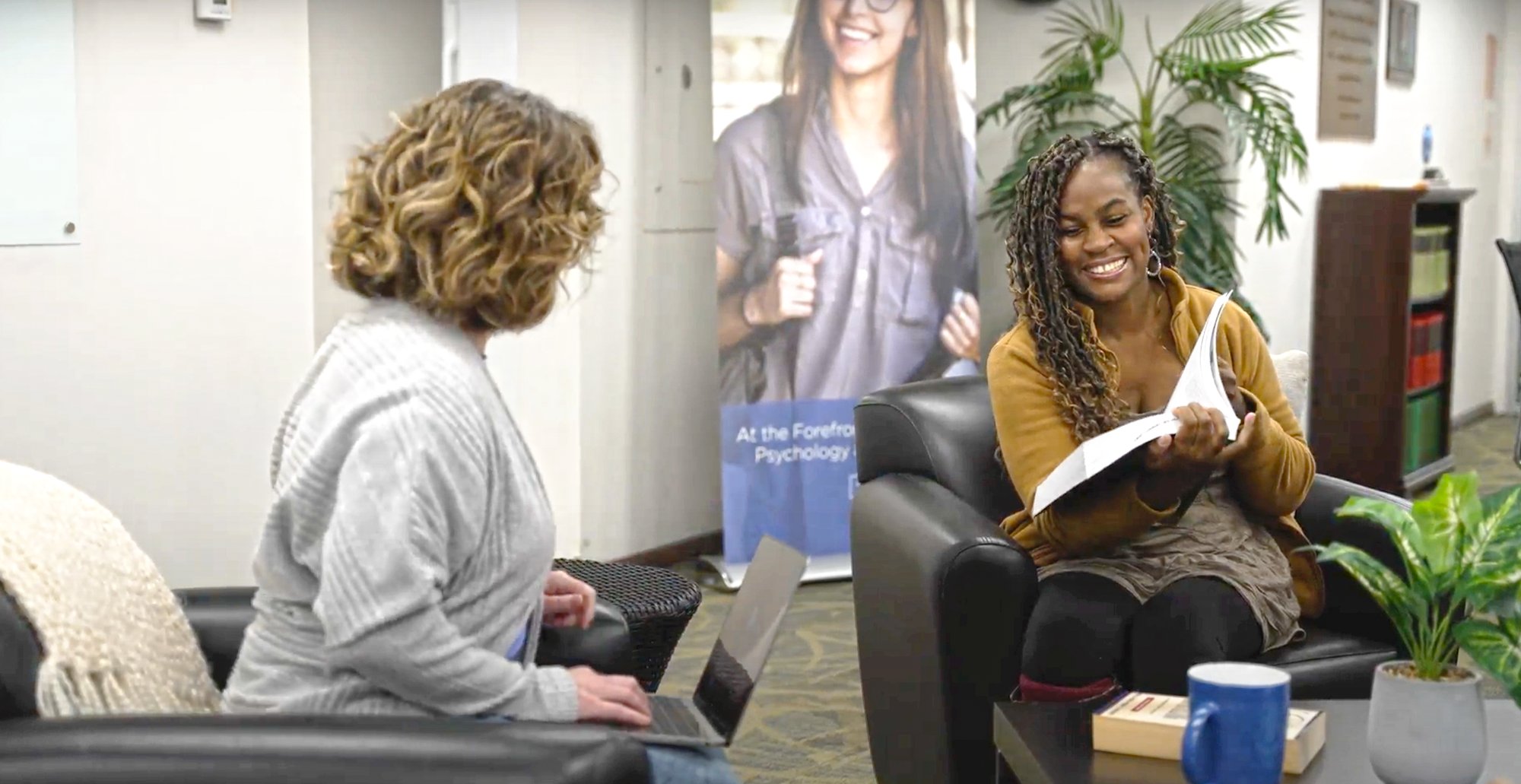
Core Values
Make an Impact while advancing your career with PAU’s CACREP-Accredited MA in Clinical Mental Health Counseling
Ready to start a rewarding career in counseling, expand your job options, or change your career path? The Master of Arts in Clinical Mental Health Counseling at Palo Alto University is your gateway to success.
You can earn your degree from a fully accredited university in just two years! Online or hybrid formats available.
The majority of MA graduates have already secured or are negotiating employment by graduation.
Put Your Passion for Helping Others to Work
Ready to start a rewarding career in counseling, expand your job options, or change your career path? The Master of Arts in Clinical Mental Health Counseling at Palo Alto University is your gateway
to success.
You can earn your degree from a fully accredited university in just two years! Online or hybrid formats available.
Program Highlights
CACREP Accredited
In-Person Residencies
Flexible Learning Options

Who Should Apply?
Recent Graduates - Bachelor's degree holders in psychology, social work, or related fields.
Career Changers - Professionals transitioning to a counseling career.
Working Adults - Those needing flexible online or hybrid learning options.
Aspiring Counselors - Individuals passionate about making a difference in mental health.
Future Leaders - Candidates aiming for leadership roles in the counseling profession.
Application Deadline
Spring 2026: November 1, 2025
Fall 2026: May 1, 2026
The MA in Clinical Mental Health Counseling program admits students on a rolling basis for the spring term, which starts in April, and the fall term, which starts in September. Both terms offer an Online format. Fall term offers students a Hybrid format. These programs can be completed in 9 quarters.
Due to issues with state authorizations outside of the state of California, we are currently unable to admit students into our online-only programs if they are located in the states found on our State Authorization. Please check back regularly for updates.
Please visit our State Authorization Page to learn if where you live qualifies.
Learn MoreStrong Job Growth for LPCCs & MFCCs Over the next 10 years!
LPCCs: +23% job growth.*
Driven by increasing demand in healthcare, education, and private practice.
MFCCs: +16% job growth.*
Rising opportunities in hospitals, outpatient care, and schools.
*U.S. Bureau of Labor Statistics
Learn more about the job outlook for LPCCs and MFCCs on the BLS website
Learn More"Strong Internships Placements and Industry Connections"
“PAU came highly recommended for its strong internship placements and industry connections, which made it an easy choice for me.”
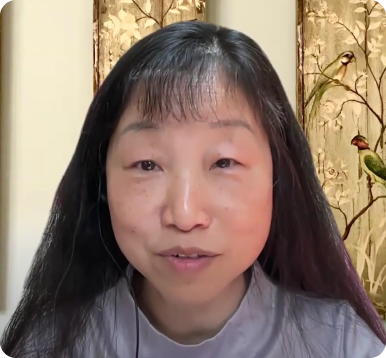
Maggie Tsai
"Small Cohort Where You Have a Great Student to Faculty Ratio"
“The reason I chose PAU is because I found a true sense of belonging here, and there's this focus on a small cohort where you have a great student to faculty ratio. And to me, that was quite important. That's the support I needed. You're made to feel welcome from day one.”
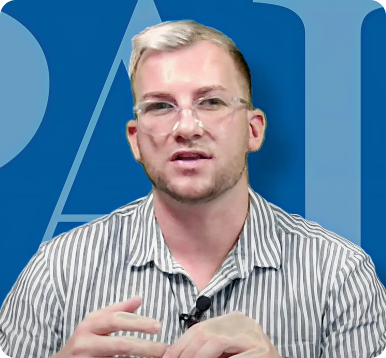
David Rouxel PhD in Clinical Psychology Student
"Living Up to Their Mission"
“The hope PAU gave me. It has been indescribable, because I didn't think I would be where I am today and, thanks to PAU, like PAU made that happen. So they're definitely living up to their mission.”
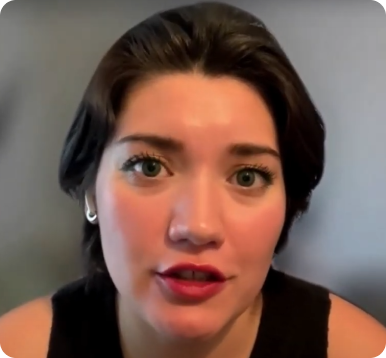
Javi Garces BS in Psychology and Social Action Student
"A Sense of Community is One of the Major Assets"
“We have a culture here in the University of support among cohorts and students and even across different cohorts. That is something that also is very helpful. And I think that the university actively stimulates these types of spaces. Having a sense of community is one of the major assets that you get here at PAU.”

Michel Rattner PhD in Clinical Psychology Student
Learn More About our Counseling Department and Expert Faculty
The Counseling Department faculty bring strong backgrounds in clinical practice, research, advocacy, counselor education, and other disciplines that are the basis of practice as a clinician, researcher, counselor educator, and supervisor.
Admissions Requirements
Admissions Requirements
Applicants must hold a bachelor's degree from a regionally-accredited institution or the international equivalent. For applicants to the MA in Clinical Mental Health Counseling Online program, you must be located in a state in which we are authorized to provide online education. While no prerequisites are required to apply, we strongly recommend applicants to have related volunteer or work experience in the mental health field.
GRE scores are not required for admissions to PAU master's degree programs. GRE scores will not be considered in the review of applications, even if students provide them.
Palo Alto University offers students a multicultural focus that emphasizes culture, social justice, and families that students experience in weekly live classes. Students benefit from the latest academic research and clinical approaches while tailoring their experience to the culture and community in which they live and practice, all in a program format that fits into their busy lives.
- The hybrid program is offered weekday evenings. Courses are held on the PAU campuses or live via Zoom.
- Classes take place Monday-Thursday evenings from 4-6 pm or 6-8 pm or 6-8:50 pm, depending on the cohort.
- All skill-based clinical work is done in an appropriate clinical or classroom setting
With the time savings from your online classes, you will be able to take three classes per quarter – which means earning your degree in just nine quarters. Staying local while participating in a distance learning (online) master’s degree program gives students the best of both worlds.
Online: Distance Learning Format
When you enroll in PAU’s distance learning courses, you will attend all classes online in a live Zoom classroom.
Info about Residency for online students only: You will meet your professors and classmates in-person during two residential training experiences. These intensive study and competency-based skill training seminars culminate in a clinical interviewing assessment that is a prerequisite for clinical fieldwork.
Students learn through lecture, discussion, and research, and apply new knowledge in an internship, all guided by their professors. Instructors of online courses are trained in distance learning teaching methods, and advisors serve as coaches to help students address the challenges unique to online learning.
NOTE: Online students must be located in a state in which we are authorized to provide online education. Please review PAU's State Authorizations page.
MA in Counseling Residencies: Residency Information
As part of the MA Counseling degree requirement, two in-person residencies are required for distance-learning (online) students. These residencies will require students to make their way to the Bay Area for a week of intensive experiential learning/training with peers and faculty on counseling and clinical skills development.
These residencies will help to enhance your clinical skills, will provide opportunities for meaningful interactions with faculty, staff, and students, and will be crucial benchmarks in your journey to becoming a professional counselor.
Students are responsible for all costs associated with these residencies, including travel, accommodations, food, etc.
Tuition and Fees
General Grad Degree Requirements

CACREP Accredited Training
Palo Alto University's CACREP-accredited programs and faculty training meet or exceed quality standards, reflecting our commitment to providing the highest level of care for all students. Palo Alto University was most recently accredited in January 2017 and received the maximum of eight (8) years CACREP accreditation.
PAU Counseling Department offers a master’s degree in the CACREP-accredited specialty area in Clinical Mental Health Counseling. As part of that program students may complete an emphasis in Marriages, Family, and Child Counseling. Content in the emphasis area does not fall under the scope of CACREP-accreditation and is not reviewed by CACREP.
Cohort Model
PAU’s on-campus format uses a cohort system. You will be assigned to a group of students who will have the same schedule and sequence of courses for their entire program. You will be enrolled continuously and to complete your degree on schedule with their cohort.
Why Cohorts?
Support and openness – you will study together, encouraging and assisting others when needed. You will also develop the familiarity and trust to discuss tough issues and personal experiences.
Residential Hybrid (On-Campus) Format Course Sequence
Click the links below to view and download the specific course sequence for the quarter in which students can start the on-campus program. Students receive their official degree plan for their cohort prior to beginning the program.
- Fall Start, Residential Hybrid, 9 Quarters, MA in CMHC(PDF)
- Fall Start, Residential Hybrid, 9 Quarters, MA in CMHC with MFCC Emphasis (PDF)
Distance Learning (Online) Format Course Sequence
Click the links below to view and download the specific course sequence for the quarter in which students can start the online program. Students receive their official degree plan for their cohort prior to beginning the program.
- Fall Start, Online, 9 Quarters, MA in CMHC (PDF)
- Fall Start, Online, 9 Quarters, MA in CMHC with MFCC Emphasis (PDF)
- Spring Start, Online, 9 Quarters, MA in CMHC (PDF)
- Spring Start, Online, 9 Quarters, MA in CMHC with MFCC Emphasis (PDF)
For course descriptions, please see the Palo Alto University Catalog.
Palo Alto University is on the quarter-unit system:
- Fall quarter: September to December
- Winter quarter: January to March
- Spring quarter: April to June
- Summer quarter: June to August
Information about work and schooling schedule
Monday-Thursday evenings 4-6 pm or 6-8 pm or 6-8:50 pm (depending on cohort).
During the first year of the program most students can maintain full-time employment during the day, and study in the evenings and on weekends.
During the second year students should be aware that evening and weekend practicum placements are extremely hard to find. Most students will need to adjust their schedules in order to spend two days during the normal workweek to complete their practicum experience.
Students are expected to be enrolled continuously and to complete their degree on schedule with their cohort.
Practicums and Internships for Direct Counseling Experience
As you progress through the MA in Clinical Mental Health Counseling program, you will gain critical hands-on experience through an on-site practicum in a community organization.
The program requires a minimum of 700 hours, including a minimum of 280 face-to-face client hours with the student working in the role of Counselor Trainee or Therapist Trainee, over a minimum of three academic quarters (typically 9-12 months). A portion of these hours come from class time.
Supervision occurs at your practicum site and with PAU faculty online. All students will meet online on Tuesday evenings.
Finding Your Fieldwork Site
PAU’s Clinical Training Team will help you as you secure an ideal practicum or field placement in your community that matches your specific interests – and support you throughout your field experience.
We work closely with mental health agencies throughout the San Francisco Bay area and beyond.
PAU students have completed practicums at:
- School districts
- Teen counseling centers
- Adult psychological service agencies
- Aging senior counseling centers
- Community mental health agencies
- Hospitals
- Non-profit and faith-based organizations, such as the Salvation Army and the YMCA
- And more
If you live outside the San Francisco Bay Area, the Team will work with you to find practicum and internship sites near your home community.
Online & Hybrid Learning Format
The hybrid program is offered weekday evenings. Courses are held on the PAU campuses or live via Zoom.
Classes Take Place:
Monday-Thursday Evenings
4-6 pm or 6-8 pm or 6-8:50 pm (depending on cohort)
All skill-based clinical work is done in an appropriate clinical or classroom setting. And with the time savings from your online classes, you will be able to take three classes per quarter – and that means earning your degree in just nine quarters.
Staying local while participating in a distance learning (online) master’s degree program gives students the best of both worlds.
Palo Alto University offers students a multicultural focus that emphasizes culture, social justice, and families that students experience in weekly live classes. Students benefit from the latest academic research and clinical approaches while tailoring their experience to the culture and community in which they live and practice, all in a program format that fits into their busy lives.
When you enroll in PAU’s distance learning courses, you will attend all classes online in a live Zoom classroom.
Info about Residency for online students only: You will meet your professors and classmates in person during two residential training experiences. These intensive study and competency-based skill training seminars culminate in a clinical interviewing assessment that is a prerequisite for clinical fieldwork.
NOTE: Online students must be located in a state in which we are authorized to provide online education. Please review PAU's State Authorizations page.
Teaching Methods:
Students learn through lecture, discussion, and research, and apply new knowledge in an internship, all guided by their professors. The professors draw on their academic research and professional experience to the provide students with the background they need to be successful practitioners. Instructors of online courses are trained in distance learning teaching methods, and advisors serve as coaches to help students address the challenges unique to online learning.
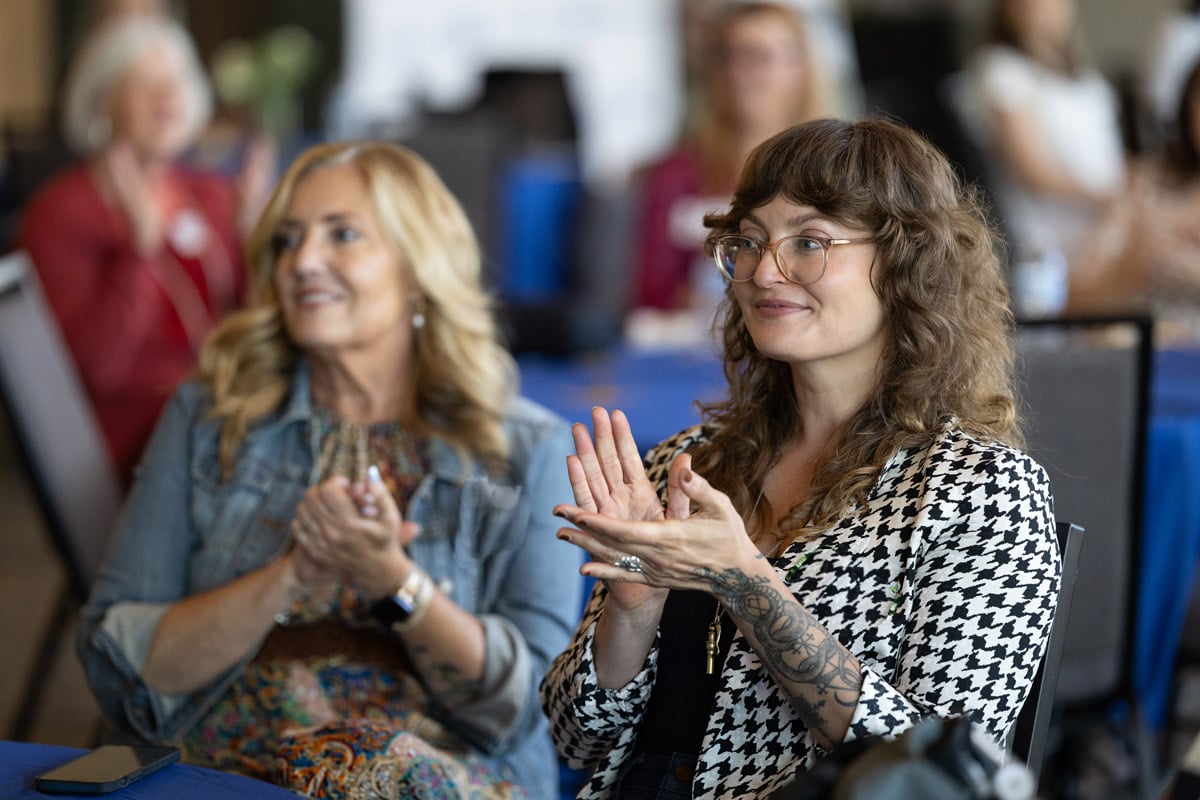
What Do LPCCs Do?
Licensed Professional Clinical Counselors (LPCC) deliver mental health care to individuals, couples and families, and groups, incorporating the principles of empirically-based and recovery-oriented counseling.
Professional counselors help clients to understand their problems and develop strategies to improve their lives. They are directly responsible for ensuring client safety, remaining compliant with all laws, and regulations and ethical guidelines for the profession. What can you do with a masters degree in Clinical Mental Health Counseling?
Specific career tracks for licensed clinical counselors include:
- Mental Health Counseling
- Private Practice
- Addiction Counseling
- School-Based Counseling
- Career and Guidance Counseling
- Community-Based Agency Practice and Management
- Rehabilitation Counseling
Non-Licensed Career Options
While most graduates of this program pursue licensure, students who defer seeking licensure may seek positions in education, research, publishing, administration, advocacy, business, and other fields, or pursue further educational opportunities at the doctoral level.
LPCC Licensure Options
In California, PAU's Master’s in Clinical Mental Health Counseling is designed to meet the educational requirements for the Professional Clinical Counselor (LPCC) license with the Board of Behavioral Sciences in the State of California (Business and Professions Code §4980.36). This degree is the first step to obtaining an LPCC license. The State of California requires graduates to accumulate two years (104 weeks) of supervision and 3,000 hours of post-master's supervised work experience.
The PAU Program and emphasis may fulfill educational requirements for licensure in many other states and territories - be sure to investigate your region's specific laws and regulations before enrolling. Students who plan to seek licensure in another state or territory should research their region's specific laws and regulations before enrolling.
What Can You Do with an MFCC Emphasis?
Marriage and Family Therapists (MFCC) may find employment in such settings as:
- Private Practice Schools and Colleges
- Social Service Agencies
- Health Maintenance Organizations
- Inpatient and Outpatient Care
- Facilities and Hospitals
- Medical and Mental Health Centers
- Nursing Homes and Residential Care Facilities
- Religious Organizations
While most graduates of this program pursue licensure, you can also find positions in education, research, publishing, administration, advocacy, business, and other fields – or go on to earn a doctoral degree.
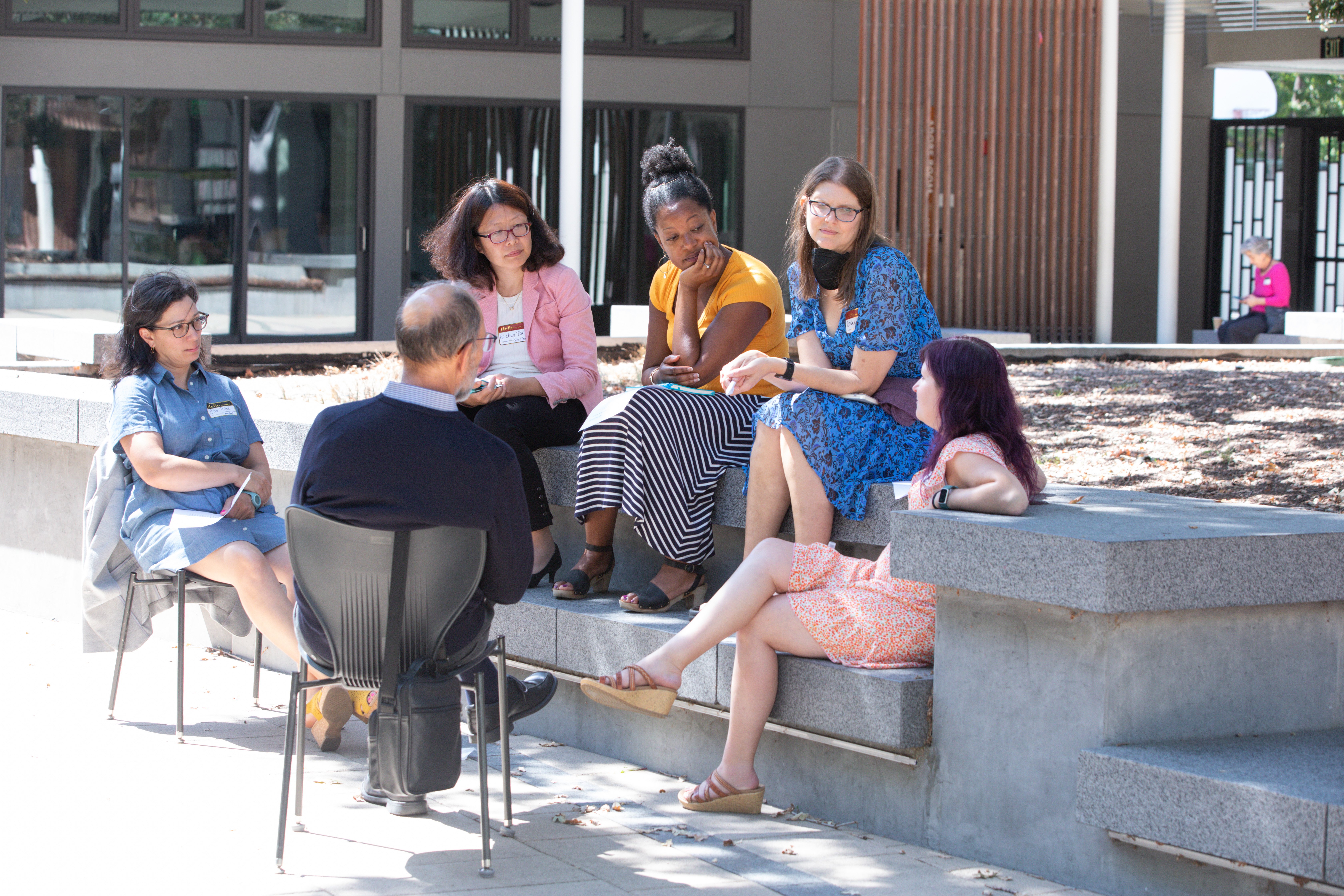
MFCC Licensure Options
In California, your Master's in Clinical Mental Health Counseling degree is the first step to obtaining an MFT or LPCC license. Before and after graduation, you will need to accumulate two years (104 weeks) of supervision and 3,000 pre- and post-master's hours of supervised work experience. The Marriage, Family and Child Counseling emphasis fulfills the State of California's educational requirements to pursue licensure as a Marriage and Family Therapist (MFT) or dual LMFT/LPCC licensure, specifically Professional Clinical Counselor (LPCC) licensure with a scope of practice that includes couples, families, and children BBS Link
The MFCC emphasis meets educational requirements for MFT licensure in California, but students in other states are cautioned from selecting this emphasis area for MFT licensure in other states. PAU’s program and emphasis may fulfill the educational requirements licensure in other states and territories – be sure to research the specific requirements for your state or country before enrolling.
State Board Information
Quick Application Checklist
How To Apply
Palo Alto University uses the psychologyCAS Centralized Application Service. In preparation for applying, you will need a copy of your transcript(s) available for your review. All materials should be submitted through the psychologyCAS, not directly to the PAU Admissions Office.
- Online Application via psychologyCAS
- Application Fee
- Official Transcripts
- Resume or CV
- Three Letters of Recommendation
- Statement of Purpose
Once Your Application is Complete
Complete applications will be reviewed within a few weeks of completion. Successful applicants will be invited to participate in a group interview that lasts approximately two hours. Participants are evaluated by both current students and Counseling faculty. Interviews are scheduled on a rolling basis.
Students accepted into the MA in Clinical Mental Health Counseling program receive an official acceptance letter by email. To enroll in the program, students who have been accepted must submit an enrollment agreement after receiving their acceptance letter to secure their place.
For students who wish to secure financial aid, it is important to begin that process as soon as possible by completing the Free Application for Federal Student Aid. Once the FAFSA is complete, the PAU Office of Financial Aid will send the student a PAU financial aid application. Use FAFSA code: 021383
Become a Nationally Certified Counselor upon Graduation
Our MA in Clinical Mental Health Counseling program has been evaluated and determined to provide the necessary educational coursework for eligibility for national certification.
Learn More HereState Authorization
Our MA in Clinical Mental Health Counseling program has been evaluated and determined to provide the necessary educational coursework for eligibility for national certification.
Review State Authorization

Office of Admissions
At Palo Alto University, we’re eager to help you take the next step in your education. You might be advancing your studies, changing direction, or exploring new opportunities—our Admissions team is ready to guide you with personalized support.
Program and Student Learning Outcomes
OUTCOME 1 - Professional Counseling Orientation and Ethical Practice
+Graduates will have internalized and integrated roles, responsibilities, and relationships of a professional counselor in alignment with ethical and legal standards of practice with a focus on serving as an advocate on behalf of clients to address systemic, institutional, architectural, attitudinal, disability, and social barriers that impede access, equity, and success. (CACREP Standards 3.1.c., 3.1.j., 3.1.d., WASC CC 1, ILO 7)
OUTCOME 2 - Social and Cultural Diversity
+Graduates will have developed an understanding of the effects of various socio historical and cultural factors on mental and physical health and wellbeing as well as strategies for identifying and eliminating barriers created by discrimination, oppression, implicit bias, and prejudices. (CACREP Standards 3.2.f., 3.2.i., WASC CC 1, 2, ILO 4)
OUTCOME 3 - Lifespan Development
+Graduates will have integrated an understanding of the theories of individual and family development across the lifespan including systemic, social justice, cultural, and environmental factors that affect lifespan development, functioning, behavior, resilience, and overall wellness. (CACREP Standards 3.3.a., 3.3.k., WASC CC 1, ILO 1, 5)
OUTCOME 4 - Career Development
+Graduates will have demonstrated the ability to apply theories and models of career development, counseling, and decision making to employ strategies for improving access to educational and occupational opportunities for people from marginalized groups. (CACREP Standards 3.4.a., 3.4.k., WASC CC 1, 4, ILO 1)
OUTCOME 5 - Counseling Practice and Relationships
+Graduates will have applied theories and models of counseling through essential interviewing, counseling, and case conceptualization skills and will have integrated a critical thinking approach to conceptualizing client development, presenting issues, and culturally relevant counseling strategies and approaches. (CACREP Standards 3.5.a., 3.5.b., 3.5.c., 3.5.g., WASC CC 1, ILO 2, 4, 5)
OUTCOME 6 - Group Counseling and Effective Leadership
+Graduates will have incorporated theoretical foundations of group work to become a group process facilitator and a positive force in achieving high levels of participation, cooperation and cohesion in group work across diverse counseling settings and with diverse client populations. (CACREP Standards 3.6.a, 3.6.b., 3.6.f., 3.6.h., WASC CC 1, ILO 2, 4, 5)
OUTCOME 7 - Assessment and Diagnosis
+Graduates will have acquired, refined, and demonstrated appropriate ability to assess diverse client issues for diagnosis and treatment planning using culturally informed approaches and assessments. (CACREP Standards 3.7.e., 3.7.k., WASC CC 1, 2, ILO 1, 2)
OUTCOME 8 - Research and Program Evaluation
+Graduates will have demonstrated the ability to critique research and evaluate client (and/or program) outcomes in order to incorporate evidence-based, culturally responsive, counseling practices in a variety of settings. (CACREP Standards 3.8.a., 3.8.b., 3.8.i., WASC CC 1, 3, ILO 1, 3)
OUTCOME 9 (CMHC Specialty ) - Professional Practice
+Graduates will have acquired, refined, and demonstrated appropriate knowledge, skills, and dispositions to effectively assess, diagnose, and treat clients in a variety of settings as well as advocate for equitable care for the communities they serve. (CACREP Standards 5.a., 5.c., 5.d., 5.e., WASC CC 1, 2, 4, ILO 1, 2, 6, 8)
OUTCOME 10 (MFCC Emphasis Only*) - Professional Practice
+Graduates will have acquired, refined, and demonstrated appropriate knowledge, skills, and dispositions to effectively work with couples, families, and other systems in a variety of settings. (CACREP Standards 5.g., 5.h., 5.j., WASC CC 1, 2, 4, ILO 1, 2, 6, 8)
*This outcome is required only for students who select the MFCC emphasis.
Frequently Asked Questions
Are there any required prerequisite courses?
+No. The MA in Clinical Mental Health Counseling does not require prerequisite courses.
International Students:
+International students currently living in the U.S. in F-1 status and students who would need to receive an F-1 visa in order to study in the United State, are not eligible to apply for PAU Masters in Clinical Mental Health Counseling on-campus format.
Where to Send Application Documents:
+Most documents can be submitted electronically via the application process in psychologyCAS. Transcripts and test scores should be sent directly to PSYCAS. Instructions can be found via the psychologyCAS Applicant Help Center. Paper transcripts can be mailed to the following address:
PSYCAS Transcript Processing Center
P.O. Box 9138
Watertown, MA 02471
After enrolling in the program, conditionally admitted students must submit final official transcripts directly to the Office of admissions as soon as possible. Failure to submit final official transcripts by the first day of classes will result in a registration hold. Any student who does not submit final transcripts by the end of the first quarter will be dropped from their courses.
What should I include in my statement of purpose?
+Formatting:
- Maximum of 2 pages
- 1.5 line-spaced
- 12-point font
- 1 -inch margins
The paper should address the following questions:
- What does being a professional counselor mean to you?
- Why have you chosen to pursue a career in professional counseling?
- How have your previous school, work, or training experiences prepared you to pursue graduate studies in counseling?
- What personal characteristics or strengths will contribute to your being an effective counselor?
The most important piece of advice is to respond to the questions asked in the prompt and to adhere to length and style requirements. Beyond that, the statement of purpose is the primary way for the admissions Committee to hear your voice. There is no need to rehash your resume – take the opportunity to talk about your passions and interests specific to counseling.
You are welcome to address personal circumstances or hardship in your application if it helps frame your interest in the field. Please remember, however, that your statement of purpose is not a diary entry or a counseling session. Oversharing can raise concerns about boundary issues and personal judgment. If you address a past hardship, we encourage you to provide analysis and self-reflection of the situation, rather than just a description of what happened. If the situation is too fresh, and you feel you cannot distance yourself enough to provide analysis yet, it may be best to choose another topic for your statement of purpose.
What is the GPA requirement?
+We recommend a 3.0 cumulative GPA. However, we do a comprehensive review of all your application materials.
What is the transfer policy?
+Admitted students can request to transfer up to 9 semester units or 13.5 quarter units of prior graduate work. Previous coursework cannot be more than 5 years old and must be completed with a grade of “B” or better. Transfer coursework is evaluated on a case-by-case basis, and students must submit a comprehensive syllabus for each requested transfer course. A Palo Alto University faculty member then reviews the documentation and either accepts or rejects the course for transfer credit. Students have access to the transfer unit request form after they confirm their enrollment in the program.
Not all courses are eligible for transfer credit – only those listed below. Students should also be aware that in order to receive transfer credit, the previous course must be at least as many units as the PAU equivalent. For semester-based programs, courses to be reviewed for transfer must be 3 units, and for quarter-based programs, courses to be reviewed for transfer must be 4.5 units to be considered.
- CLIN601: Multicultural Counseling Theories and Techniques (4.5 units)
- CLIN604: Addiction Counseling (4.5 units)
- CLIN610: Legal & Ethical Foundations (4.5 units)
- CLIN618: Family Systems Theory (MCFC) (4.5 units)
- CLIN619: Couples Counseling (MCFC) (4.5 units)
- CLIN634: Human Sexuality (4.5 units)
- CLIN651: Community Mental Health (4.5 units)
- CLIN680: Psychopharmacology (4.5 units)
- COUN600: Counseling Theory (4.5 units)
- COUN603: Appraisal & Assessment in Counseling (4.5 units)
- COUN612: Life Span Development (4.5 units)
- COUN634: Diagnosis (4.5 units)
- COUN641: Research & Program Evaluation (4.5 units)
- COUN661: Career Development Theories and Techniques (4.5 units)
- Approved Counseling Elective (CMHC) (4.5 units)
Do I have to choose a cohort when I submit my application?
+No. If admitted to the program, students will let us know their preferred cohort via their Enrollment Agreement form. The Counseling Department will try to match students to their preferred cohort; however, cohort assignments are based on space availability and are not guaranteed.
Can I complete this program online from anywhere?
+Please review our list of unauthorized states. If you are located in an unauthorized states, we will not be able to consider your application for admissions. If you live outside of the US, you may apply, but please check your country’s counseling licensure information to determine if this program meets your professional needs.
Am I guaranteed a spot with the cohort that I select on my application?
+You will confirm your final cohort preference if you’re admitted and commit to attending PAU. Cohorts are assigned based on space available and not guaranteed. Students receive their cohort assignments and class schedules approximately one month before classes. Requests to change cohorts must be evaluated by the department at that time and changes are not guaranteed.


